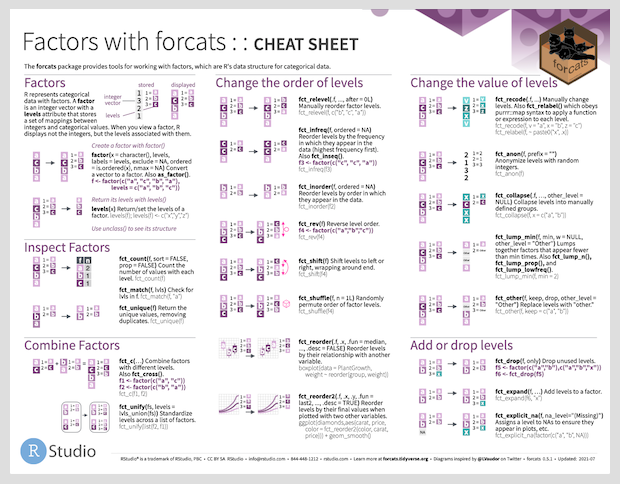-
Notifications
You must be signed in to change notification settings - Fork 7
/
Copy path05-forcats.Rmd
104 lines (79 loc) · 2.42 KB
/
05-forcats.Rmd
1
2
3
4
5
6
7
8
9
10
11
12
13
14
15
16
17
18
19
20
21
22
23
24
25
26
27
28
29
30
31
32
33
34
35
36
37
38
39
40
41
42
43
44
45
46
47
48
49
50
51
52
53
54
55
56
57
58
59
60
61
62
63
64
65
66
67
68
69
70
71
72
73
74
75
76
77
78
79
80
81
82
83
84
85
86
87
88
89
90
91
92
93
94
95
96
97
98
99
100
101
102
103
104
---
title: "05-forcats"
author: "Silvia P. Canelón"
date: "9/19/2020"
output: html_document
---
class: penguin-tour
```{r, echo=FALSE, out.width=1200}
knitr::include_graphics("images/pptx/05-forcats.png")
```
.footnote[<span>Photo by <a href="https://unsplash.com/@eadesstudio?utm_source=unsplash&utm_medium=referral&utm_content=creditCopyText">James Eades</a> on <a href="https://unsplash.com/collections/12240655/palmerpenguins/d5aed8c855e26061e5e651d3f180b76d?utm_source=unsplash&utm_medium=referral&utm_content=creditCopyText">Unsplash</a></span>
]
---
background-image: url(images/hex/forcats.png)
background-position: 1050px 50px
background-size: 80px
# forcats: info
.panelset[
.panel[.panel-name[Overview]
### Helps us work with **categorical variables** or factors.
### These are variables that have a fixed and known set of possible values, like **species**, **island**, and **sex** in our `penguins` dataset.
]
.panel[.panel-name[Cheatsheet]
`r icon::fa("file-pdf")` PDF: https://github.com/rstudio/cheatsheets/raw/master/factors.pdf

]
.panel[.panel-name[Reading]
.left-column[
```{r echo=FALSE}
knitr::include_graphics("images/r4ds-cover.png")
```
]
.right-column[
### R for Data Science: [Ch 15 Factors](https://r4ds.had.co.nz/factors.html)
### Package documentation: https://forcats.tidyverse.org/
]
]
]
---
background-image: url(images/hex/forcats.png)
background-position: 1050px 50px
background-size: 80px
# forcats: exercise
.panelset[
.panel[.panel-name[Code]
.pull-left[
### Currently the **year** variable in `penguins` is continuous from 2007 to 2009.
### There may be situations where this isn't what we want and we might want to turn it into a categorical variable instead.
]
.pull-right[
### The `factor()` function is perfect for this.
```{r eval=FALSE}
penguins %>%
mutate(year_factor =
factor(year, #<<
levels = unique(year))) #<<
```
]
]
.panel[.panel-name[Result]
### The result is a new factor **year_factor** with levels **2007**, **2008**, and **2009**
.pull-left[
```{r}
penguins_new <-
penguins %>%
mutate(year_factor =
factor(year, #<<
levels = unique(year))) #<<
penguins_new
```
]
.pull-right[
```{r}
class(penguins_new$year_factor)
levels(penguins_new$year_factor)
```
]
]
]